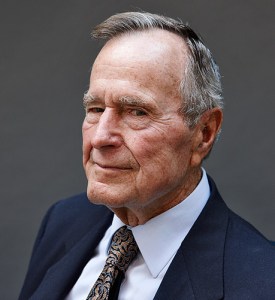For personal reasons, I was unable to post in a more timely manner on the passing of one of our most respected Old Money political leaders.
We’ve profiled the late president George Herbert Walker Bush on this blog before. As many have commented in the media, his passing (combined with the passing of John McCain) marks the end of an era. He served his country in the military, in appointed positions, and in elected offices with competence, dignity, and integrity.
Until I can settle and gather my thoughts–and some revealing anecdotes–on Mr. Bush, I will leave it to others.
Washington Post columnist Fareed Zakaria had this to say about the WASP culture (what we here refer to as Old Money culture) that the 41st president grew up in:
The death of George H.W. Bush has occasioned a fair amount of nostalgia for the old American establishment, of which Bush was undoubtedly a prominent member. It has also provoked a heated debate among commentators about that establishment, whose membership was determined largely by bloodlines and connections. You had to be a white Anglo-Saxon Protestant to ascend to almost any position of power in the United States until the early 1960s. Surely, there is nothing good to say about a system that was so discriminatory toward everyone else?
Actually, there is. For all its faults — and it was often horribly bigoted, in some places segregationist and almost always exclusionary — at its best, the old WASP aristocracy did have a sense of modesty, humility and public-spiritedness that seems largely absent in today’s elite. Many of Bush’s greatest moments — his handling of the fall of communism, his decision not to occupy Iraq after the first Gulf War, his acceptance of tax increases to close the deficit — were marked by restraint, an ability to do the right thing despite enormous pressure to pander to public opinion.
But, and here is the problem, it is likely these virtues flowed from the nature of that old elite. The aristocracy was secure in its power and position, so it could afford to think about the country’s fate in broad terms, looking out for the longer term, rising above self-interest — because its own interest was assured. It also knew that its position was somewhat accidental and arbitrary, so its members adhered to certain codes of conduct — modesty, restraint, chivalry, social responsibility.
If at this point you think I am painting a fantasy of a world that never existed, let me give you a vivid example. On the Titanic’s maiden voyage, its first-class cabins were filled with the Forbes 400 of the age. As the ship began to sink and it became clear there were not enough lifeboats for everyone, something striking took place. As Wyn Wade recounts, the men let the women and children board the boats. In first class, about 95 percent of the women and children were saved, compared with only about 30 percent of the men. While, of course, first-class passengers had easier access to the boats, the point remains that some of the world’s most powerful men followed an unwritten code of conduct, even though it meant certain death for them.
This historical example reveals the heart of the Old Money philosophy. It’s a philosophy that Mr. Bush was born into, and did his best to honor through his lifetime.
Well done, sir.
- BGT
